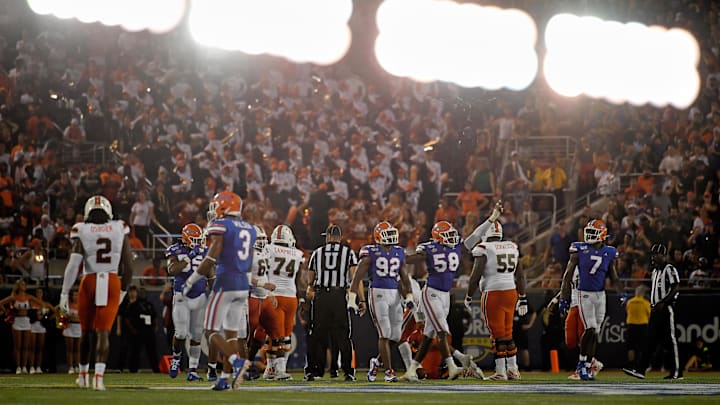Rivalries are part of what makes college football great, and Florida Football has plenty of them. FSU, Georgia, and Tennessee are three of the biggest games on the calendar annually, and winning those games alone can make or break a season.
Then there are opponents like Miami, who bring just as much intensity out of everyone involved. While everyone agrees it would be fun to play more often, finding a permanent home on the calendar becomes a bit more complicated.
Florida Football: I Hate Everything About You
Earlier in the week at ACC Media Days, Pitt coach Pat Narduzzi mused that Penn State wouldn't schedule them in football even though he felt both institutions would benefit from an annual game.
We'll let those two schools figure out their own problems, but it also doesn't feel too dissimilar to the position Florida finds itself in with whether it should play Miami with more frequency. The two schools played yearly from 1938 to 1987 but have only played seven times since.
When he was asked about the rivalry during his appearance at ACC Media Days, Miami coach Mario Cristobal acknowledged the rivalry but wasn't putting too much focus on the game.
"It’s a tremendous rivalry. I know our fanbase, and everybody is really incredibly fired up about that. But we’re not going to be talking about the Florida Gators."
Mind you that is a different tone than the one he had last month during ACC Spring Meetings:
"Miami, Florida, and Florida State playing each other is paramount, in my opinion"
The realities of a conference schedule ended the series in 1988 and continue to act as a backdrop as to why the series isn't more frequent now. Florida has its game with FSU set in stone, and the Gators have been trying to beef up their opening-day game opponent in recent years, with Michigan, Miami, and Utah among their recent opponents. The Gators have future games lined up with Colorado and NC State and had games scheduled with Texas and California that have since been canceled.
The Gators could scrap all those other games and make Miami their sole opening-week opponent, but if the SEC eventually expands to nine games, it might dampen their enthusiasm to do so.
Make no mistake—playing Miami is going to be far more fun and interesting than opening the season against UMass or New Mexico State. Playing Miami is also more fun than playing NC State or Michigan if we are being honest.
But in the age of the college football playoff, business choices have to be made as well. Let's pretend that Florida goes 9-3 this season (I said pretend). Would the playoff committee reward the Gators for playing Miami, UCF, and FSU in their nonconference, or for the sole purpose of making the playoffs would the Gators be better off having a nonconference slate of Furman, Middle Tennessee, Wake Forest, and Georgia Southern (looking at you, Ole Miss)?
Thus, the struggle of secondary college football rivalries that are not set in stone. As a pure entertainment product, the game is better off with them. However, as the theory of the prisoner's dilemma attests, if some are engaging in their secondary rivalries and others are not, the ones who are engaging want to ensure they aren't being placed at a competitive disadvantage.
